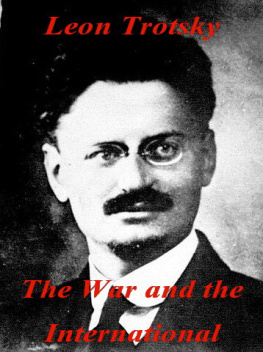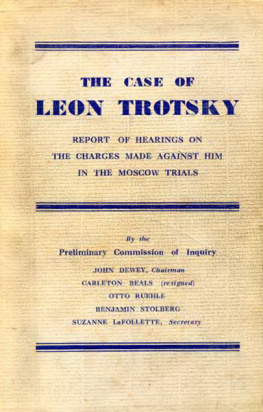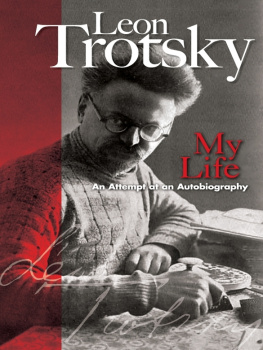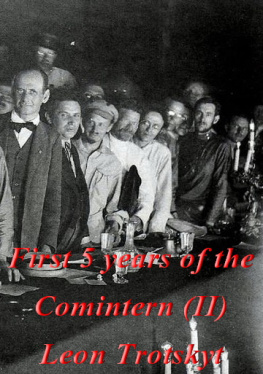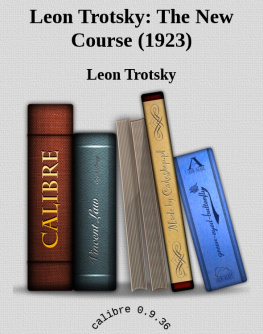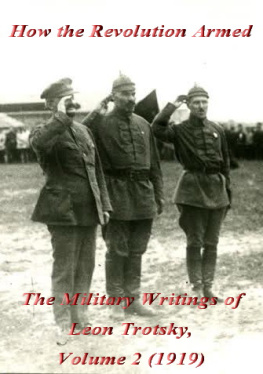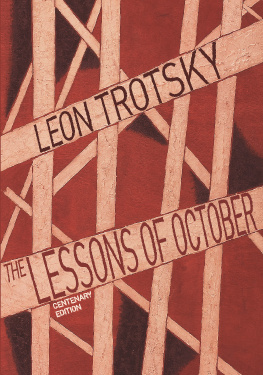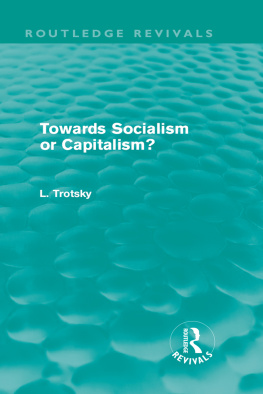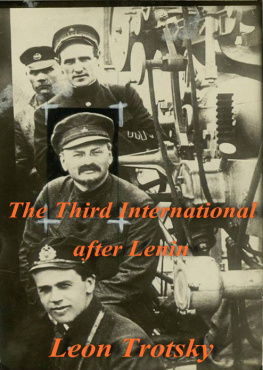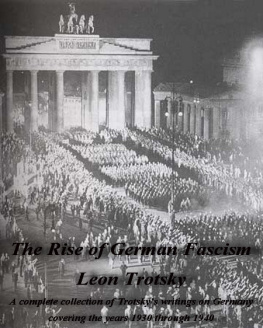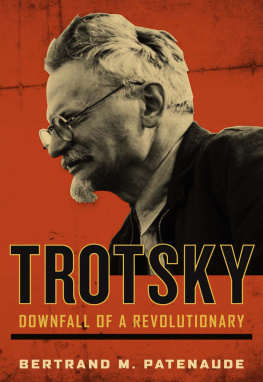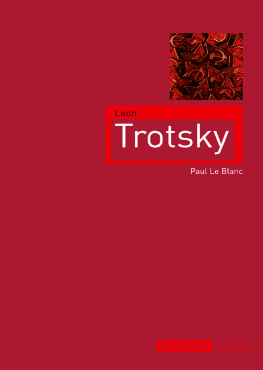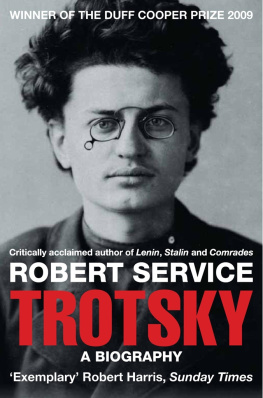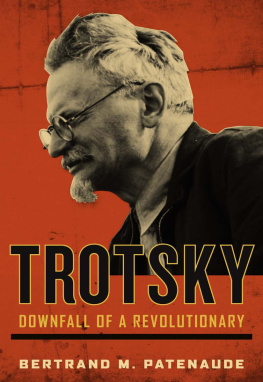PART I
Authors Preface
T he forces of production which capitalism has evolved haveoutgrown the limits of nation and state. The national state, the present political form, is toonarrow for the exploitation of these productive forces. The natural tendency of our economicsystem, therefore, is to seek to break through the state boundaries. The whole globe, the land andthe sea, the surface as well as the interior has become one economic workshop, the different partsof which are inseparably connected with each other. This work was accomplished by capitalism. Butin accomplishing it the capitalist states were led to struggle for the subjection of theworld-embracing economic system to the profit interests of the bourgeoisie of each country. Whatthe politics of imperialism has demonstrated more than anything else is that the old national statethat was created in the revolutions and the wars of 1789-1815, 1848-1859, 1864-1866, and 1870 has outlived itself, and is now anintolerable hindrance to economic development.
The present war is at bottom a revolt of the forces of production against the political form ofnation and state. It means the collapse of the national state as an independent economic unit.
The nation must continue to exist as a cultural, ideologic and psychological fact, but itseconomic foundation has been pulled from under its feet. All talk of the present bloody clash beinga work of national defense is either hypocrisy or blindness. On the contrary, the real, objectivesignificance of the War is the breakdown of the present national economic centers, and thesubstitution of a world economy in its stead. But the way the governments propose to solve thisproblem of imperialism is not through the intelligent, organized cooperation of all ofhumanitys producers, but through the exploitation of the worlds economic system bythe capitalist class of the victorious country; which country is by this War to be transformed froma Great Power into the World Power.
The War proclaims the downfall of the national state. Yet at the same time it proclaims thedownfall of the capitalist system of economy. By means of the national state, capitalism hasrevolutionized the whole economic system of the world. It has divided the whole earth among theoligarchies of the great powers, around which were grouped the satellites, the small nations, wholived off the rivalry between the great ones. The future development of world economy on thecapitalistic basis means a ceaseless struggle for new and ever new fields of capitalistexploitation, which must be obtained from one and the same source, the earth. The economic rivalryunder the banner of militarism is accompanied by robbery and destruction which violate theelementary principles of human economy. World production revolts not only against the confusionproduced by national and state divisions but also against the capitalist economic organizations,which has now turned into barbarous disorganization and chaos.
The War of 1914 is the most colossal breakdown in history of an economic system destroyed by itsown inherent contradictions.
All the historical forces whose task it has been to guide the bourgeois society, to speak in itsname and to exploit it, have declared their historical bankruptcy by the War. They defendedcapitalism as a system of human civilization, and the catastrophe born out of that system isprimarily their catastrophe. The first wave of events raised the national governments and armies tounprecedented heights never attained before. For the moment the nations rallied around them. Butthe more terrible will be the crash of the governments when the people, deafened by the thunder ofthe cannon, realize the meaning of the events now taking place in all their truth andfrightfulness.
The revolutionary reaction of the masses will be all the more powerful the more prodigious thecataclysm which history is now bringing upon them.
Capitalism has created the material conditions of a new Socialist economic system. Imperialismhas led the capitalist nations into historic chaos. The War of 1914 shows the way out of this chaosby violently urging the proletariat on to the path of Revolution.
For the economically backward countries of Europe the War brings to the fore problems of a farearlier historic origin problems of democracy and national unity. This is in a largemeasure the case with the peoples of Russia, Austria-Hungary, and the Balkan Peninsula. But thesehistorically belated questions, which were bequeathed to the present epoch as a heritage from thepast, do not alter the fundamental character of the events. It is not the national aspirations ofthe Serbs, Poles, Rumanians or Finns that has mobilized twenty-five million soldiers and placedthem in the battlefields, but the imperialistic interests of the bourgeoisie of the Great Powers.It is imperialism that has upset completely the European status quo, maintained for forty fiveyears, and raised again the old questions which the bourgeois revolution proved itself powerless tosolve. Yet in the present epoch it is quite impossible to treat these questions in and bythemselves. They are utterly devoid of an independent character. The creation of normal relationsof national life and economic development on the Balkan Peninsula is unthinkable if Czarism andAustria-Hungary are preserved. Czarism is now the indispensable military reservoir for thefinancial imperialism of France and the conservative colonial power of England. Austria-Hungary isthe mainstay of Germanys imperialism. Issuing from the private family clashes between thenational Serbian terrorists and the Habsburg political police, the War very quickly revealed itstrue fundamental character a struggle of life and death between Germany and England. Whilethe simpletons and hypocrites prate of the defense of national freedom and independence, the GermanEnglish War is really being waged for the freedom of the imperialistic exploitation of the peoplesof India and Egypt on the one hand, and for the imperialistic division of the peoples of the earthon the other.
Germany began its capitalistic development on a national basis with the destruction of thecontinental hegemony of France in the year 1870-1871. Now that the development of Germany industryon a national foundation has transformed Germany into the first capitalistic power of theworld, she finds herself colliding with the hegemony of England in her further course ofdevelopment. The complete and unlimited domination of the European continent seems to Germany theindispensable prerequisite of the overthrow of her world enemy. The first thing, therefore, thatimperialistic Germany writes in her program is the creation of a Middle European League of Nations.Germany, Austria-Hungary, the Balkan Peninsula and Turkey, Holland, the Scandinavian countries,Switzerland, Italy, and, if possible, enfeebled France and Spain and Portugal, are to make oneeconomic and military whole, a Great Germany under the hegemony of the present German state.
This program, which has been thoroughly elaborated by the economists, political students,jurists and diplomats of German imperialism and translated into reality by its strategists, is themost striking proof and most eloquent expression of the fact that capitalism has expanded beyondthe limits of the national state and feels intolerably cramped within its boundaries. The nationalGreat Power must go and in its place must step the imperialistic World Power.
In these historical circumstances the working class, the proletariat, can have no interest indefending the outlived and antiquated national fatherland, which has become the mainobstacle to economic development. The task of the proletariat is to create a far more powerfulfatherland, with far greater power of resistance the republican United States of Europe as the foundation of the UnitedStates of the World.

